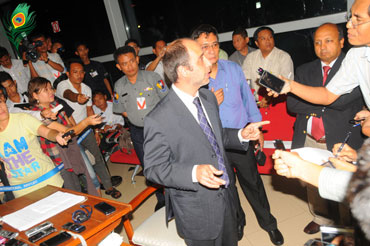Twenty-four Burmese political parties say UN special rapporteur on human rights Tomas Quintana is biased in reporting on Burma’s ethnic conflicts and have called for his removal.
 In a meeting in Rangoon with UN officials, the political party leaders said Quintana was taking the sides of the Rohingyas in the two-months long community unrest in Rakhine State, according to a report by Radio Free Asia on Sunday.
In a meeting in Rangoon with UN officials, the political party leaders said Quintana was taking the sides of the Rohingyas in the two-months long community unrest in Rakhine State, according to a report by Radio Free Asia on Sunday.
At the end of his two-day fact-finding tour on Aug. 10, Quintana called for the Burmese government to undertake a “credible” investigation because he was concerned at allegations of serious human rights violations committed as part of government measures to restore law and order.
“They include the excessive use of force by security and police personnel, arbitrary arrest and detention, killings, the denial of due process guarantees, and the use of torture in places of detention,” he said in a press conference in Rangoon.
“Quintana went to Rakhine State and made an assessment that was unfair and biased toward one side,” said Than Than Nu, the general secretary of the Democratic Party of Myanmar [Burma]. A full list of the parties that attended the meeting was not immediately available.
Party representatives at the meeting with the UN’s Marianne Hagen of the UN Rangoon office also accused Quintana of calling for the Rohingya, a stateless group, to be named as one of Burma’s ethnic nationalities. Currently, the Rohingyas are stateless and not considered one of Burma's ethnic groups by the government.
“He should be replaced with someone else,” Nu said.
As Quintana left Burma at the end of his fact-finding tour of Rakhine State, Mizzima reported that he urged Burma to undertake a credible, independent investigation into allegations of human rights violations.
“It is of fundamental importance to clearly establish what has happened in Rakhine State and to ensure accountability,” Quintana said. “Reconciliation will not be possible without this, and exaggerations and distortions will fill the vacuum to further fuel distrust and tensions between communities.”
He said the Burmese Parliament is "the most appropriate body" for the investigation.
“I believe that Parliament, as the only multi-party and multi-ethnic public institution, is the most appropriate body for the creation of such a commission and for this difficult but necessary task,” he said in a statement.
“Lessons should be learned from other countries that have experience in these processes. Assistance may be provided by the United Nations and other international organizations,” he said.
Burma considers Rohingyas to be illegal immigrants from Bangladesh and India even though large numbers of Rohingya have lived in Burma for generations An estimated 800,000 live in western Burma, and up to 300,000 live in Bangladesh as refugees from Burma.
The UN says Rohingyas are one of the world’s most persecuted minorities.


